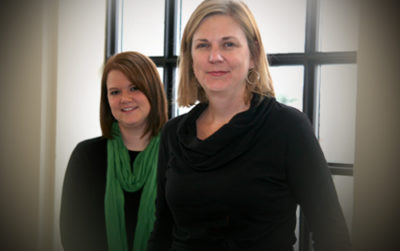Professor brings understanding to juvenile justice system
Because they comprise a small percentage of arrest rates, delinquent girls tend to be overlooked and misunderstood.
However, through research and service-learning courses, Kristi Holsinger – associate professor of Criminal Justice and Criminology in the College of Arts and Sciences – has worked to eradicate this confusion. Published in “Feminist Criminology” and the “Journal of Criminal Justice Education,” her research has helped people gain a better understanding of girls in the juvenile justice system and set a service-learning example for other universities to follow.
Offered since 2001, her course – “New Dimensions in Criminal Justice: Correctional Interventions/Delinquent Girls” – provides college students as mentors for girls in the family court system. The court only allows women to mentor the girls, so male students mentor boys. Mentoring activities have included a UMKC campus tour and trips to restaurants, parks, movies and the mall. Some mentors have even attended their mentees’ court dates. Beyond completing a minimum of five mentoring hours per week, students complete several training sessions, read required texts and write comprehensive final papers about their mentoring experiences.
“In criminal justice, it takes years to establish relationships with court agencies, and it is a great positive when our students can volunteer,” Holsinger said. “Not many universities have such mentoring programs, and this specialized training helps students gain real-world experience before they graduate.”
The course also provides students with basic knowledge about delinquent girls, including theories of female delinquency, juvenile justice processing, correctional interventions and a greater awareness of the experiences common to girls in the family court system.
A worthwhile investment
When she first signed up for the course, Emily Riesmeyer said the idea of mentoring delinquent girls scared her. She worried that the girls would not speak to her or like her. “But once they saw that you were actually there just to be with them and you weren’t getting paid, they seemed to enjoy your presence a lot more,” said Riesmeyer, who graduated with a Criminal Justice and Criminology degree in December of 2009. “I didn’t learn terms and concepts, but instead got a life lesson. I was able to learn by working one-on-one with each girl and it opened my eyes up to something so much more than a textbook ever could.”
Instead of encountering violent and unmanageable girls, Holsinger’s students often found girls who had rebelled in an effort to receive love and attention. Many of the girls felt abandoned or neglected and made comments about their parents disappointing them. Additionally, most girls had landed in the court system for committing non-violent offenses, such as stealing, causing school disruptions, possessing drugs, violating curfew or running away from an often abusive environment.
“Perhaps the most gratifying result of the course each semester is the profound change in attitudes and beliefs by the students toward ‘delinquent girls,'” Holsinger said. “Students recognize and articulate how their attitudes toward juvenile offenders are shaped by the media and lead to punitive, fear-based responses. The students have the opportunity to see that the conventional images of incarcerated girls in society do not match up to reality.”
A need for gender-specific programming
In the past, delinquent girls have been placed in programs mainly designed to serve delinquent boys – a practice that has not served girls well. Because girls are socialized to form relationships and place value on the emotional content of relationships, Holsinger has found that girls benefit more from mentorship than from programs designed for boys.
Ideal programs would take girls’ unique experiences and development into account and recognize that girls’ lives have been affected by victimization, poverty, sexism and racism. Girls would benefit from mentors who listened and validated their feelings and experiences, helped them realize their potential and supported their resistance of oppressive gendered social norms. Such relationships built on mutual respect and trust would allow the girls to open up and share their lives.
This mutual respect and trust allowed Janae Tatum to reach out and encourage girls in the court system.
“Those girls, most of them anyways, come from the same environment I do,” said Tatum, who graduated from UMKC in 2009 with a liberal arts degree and Criminal Justice and Criminology minor. “It was rewarding to show them that you can rise above such circumstances, because I have! I felt like I had so much knowledge I could give them.”
In addition to providing mentors, Holsinger found that an ideal program would provide staff training that emphasized patience, compassion and promoted positive, self-esteem-building communication with the girls. Striving toward this goal, Holsinger recently conducted a family court staff seminar on how to work more effectively with delinquent girls.
After taking the course, Riesmeyer has learned first-hand that juvenile justice is a difficult – but meaningful – field to go into.
“Even if I have to work at it for years and years – if I know I helped at least one young girl – I know that I will have made a difference,” Riesmeyer said. “And that’s all I want.”

